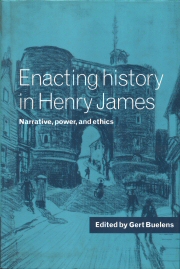Book contents
- Frontmatter
- Contents
- Notes on contributors
- Acknowledgments
- List of abbreviations
- Introduction
- 1 Power relations in the novels of James: the ‘liberal’ and the ‘radical’ version
- 2 Multiple germs, metaphorical systems, and moral fluctuation in The Ambassadors
- 3 James and the ethics of control: aspiring architects and their floating creatures
- 4 James and the shadow of the Roman Empire: manners and the consenting victim
- 5 ‘What Maisie knew’: Henry James's Bildungsroman of the artist as queer moralist
- 6 The double narrative of ‘The Beast in the Jungle’: ethical plot, ironical plot, and the play of power
- 7 Homoeroticism, identity, and agency in James's late tales
- 8 ‘A provision full of responsibilities’: senses of the past in Henry James's fourth phase
- 9 Possessing the American scene: race and vulgarity, seduction and judgment
- 10 History, narrative, and responsibility: speech acts in ‘The Aspern Papers’
- Index
10 - History, narrative, and responsibility: speech acts in ‘The Aspern Papers’
Published online by Cambridge University Press: 02 February 2010
- Frontmatter
- Contents
- Notes on contributors
- Acknowledgments
- List of abbreviations
- Introduction
- 1 Power relations in the novels of James: the ‘liberal’ and the ‘radical’ version
- 2 Multiple germs, metaphorical systems, and moral fluctuation in The Ambassadors
- 3 James and the ethics of control: aspiring architects and their floating creatures
- 4 James and the shadow of the Roman Empire: manners and the consenting victim
- 5 ‘What Maisie knew’: Henry James's Bildungsroman of the artist as queer moralist
- 6 The double narrative of ‘The Beast in the Jungle’: ethical plot, ironical plot, and the play of power
- 7 Homoeroticism, identity, and agency in James's late tales
- 8 ‘A provision full of responsibilities’: senses of the past in Henry James's fourth phase
- 9 Possessing the American scene: race and vulgarity, seduction and judgment
- 10 History, narrative, and responsibility: speech acts in ‘The Aspern Papers’
- Index
Summary
The relation between history and narrative seems at first glance fairly straightforward. History and narration have been inseparably associated in literary theory and in our everyday assumptions at least since Aristotle. In the Poetics, Aristotle prefers a probable fiction to an improbable history as the plot for a tragedy. Though narration is not the only way to represent history, it is certainly one of the major ways. We tend to assume that historical events occurred as a concatenated sequence that can be retold now as a story of some kind: first this happened and then that happened, and so on. Some form of causal or rationalizable connection is presumed. This will explain what happened and make it understandable. Narrative will tell the truth about history. Both narrative and history belong to the regime of truth. Narration is one of the chief ways to account for history, to take account of it, to rationalize and explain it, to find out its reason or ground. Fictional narrations, on the other hand, have ‘historically’, at least in the West, tended to present themselves in the guise of histories, as in Fielding's title, The History of Tom Jones, or in Thackeray's full title for Henry Esmond: The History of Henry Esmond, Esq., A Colonel in the Service of Her Majesty Q. Anne, Written by Himself, or in Henry James's remark, in his essay on Anthony Trollope, that, unless a fictional narration maintains the illusion of its historicity, it has no ground to stand on: ‘It is impossible to imagine what a novelist takes himself to be unless he regard himself as an historian and his narrative as a history. It is only as an historian that he has the smallest locus standi’ (LC-i, 1343).
- Type
- Chapter
- Information
- Enacting History in Henry JamesNarrative, Power, and Ethics, pp. 193 - 210Publisher: Cambridge University PressPrint publication year: 1997
- 4
- Cited by

